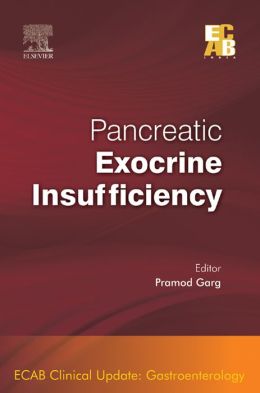
Pancreatic Exocrine Insufficiency – ECAB
$1.00
Category: Gastroenterology Internal Medicine
published date: 25 Jul 14
by Pramod Kumar Garg (Editor)
The exocrine pancreatic function can be impaired by many different pancreatic disease as well as diseases that do not appear to be directly linked to the exocrine pancreas. Hormones stimulating exocrine function
(e.g. CCK) might be reduced in diseases affecting the intestinal mucosa (IBD, celiac disease, AIDS) resulting in decreased exocrine secretion. The function of digestive enzymes might be affected by post-cibal asynchrony or by a decreased intraduodenal pH as in Zollinger-Ellison syndrome (ZE). An atrophy of pancreatic tissue might be caused by a lack of trophic factors, as may occur in IDDM, and pancreatic damage might occur due to drugs used for the treatment of other diseases. While some of these conditions appear to be rather rare and of minor clinical relevance, exocrine pancreatic involvement is very frequent in patients with diabetes mellitus. The diagnosis of the condition can be made by the exploration of the exocrine pancreatic secretion, which has been mainly used for the diagnosis of chronic pancreatitis and detection of pancreatic exocrine insufficiency of any etiology. Thus, diagnosis of the disease is classically based on the demonstration of either the morphological and/or the functional changes that typically develop over time in the course of the disease. Exocrine pancreatic function impairs progressively as chronic pancreatitis develops. Thus, exocrine pancreatic dysfunction refers to a mild, moderate or severe reduction of the exocrine pancreatic secretion. Finally, pancreatic function becomes insufficient to maintain a normal digestive process. Pancreatic exocrine insufficiency refers to the stage of maldigestion and malabsorption of nutrients as a consequence of a primarily and/or secondarily impaired exocrine pancreatic function. Pancreatic enzymes remain as the cornerstone for the effective treatment of various disease pathologies resulting in pancreatic exocrine insufficiency. The rigid criteria set forth by the FDA in the USA will ensure that effective pancreatic enzyme preparations will be available and allow the clinician to successfully treat maldigestion, malabsorption, vitamin deficiencies, protein-calorie malnutrition, and in selected patients, the abdominal pain associated with chronic pancreatitis and PEI. Pancreatic enzymes are particularly underused in chronic pancreatitis patients with PEI, post-gastric and intestinal surgery patients who develop an asynchrony of enzyme delivery to the intestine, and pancreatic cancer patients. Earlier use of potent pancreatic enzymes will enhance the quality of life for these patients.
This clinical update has been designed to update the readers on the important aspects of the pancreatic exocrine insufficiency, resulting from different conditions and its impact on the patient. The book has stressed upon the various aspects of the condition like its etiology, diagnosis, evaluation, and management approach to the patient. Overall, the book presents to the readers an excellent compilation of clinically applicable literature sourced from the most acclaimed physicians across globe.
Product Details
- ISBN-13: 9788131231920
- Publisher: Elsevier Health Sciences APAC
- Publication date: 6/13/2013
DETAILS
-
Publisher
-
Language
-
ISBN9788131231920
-
Category
